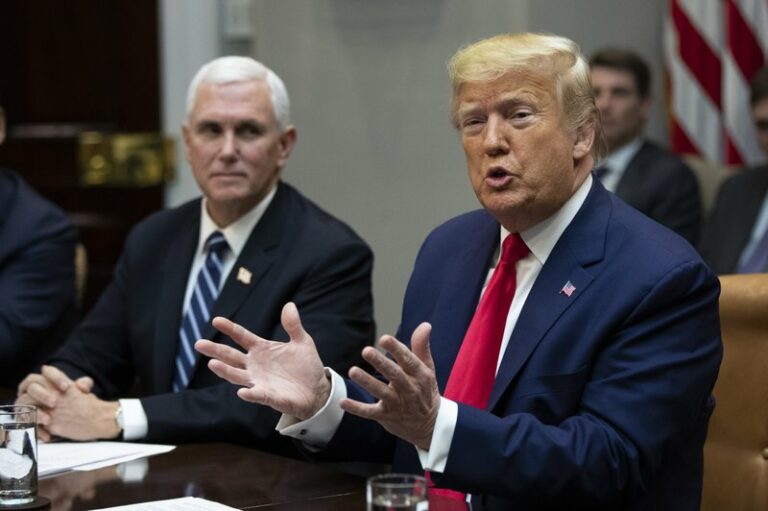The Democratic-controlled House passed an $8.3 billion measure Wednesday to battle the coronavirus outbreak that’s spreading rapidly and threatening a major shock to the economy and disruptions to everyday life in the U.S.
The swift and sweeping bipartisan vote was a relative rarity in a polarized Washington and came just nine days after the president outlined a $2.5 billion plan that both Trump’s GOP allies and Democratic critics said was insufficient.
The 415-2 vote came after House Speaker Nancy Pelosi beat a tactical retreat on vaccine price guarantees and followed a debate that lasted only a few minutes.
“The government’s greatest responsibility is to keep Americans safe,” said House Appropriations Committee Chairwoman Nita Lowey, D-N.Y. “This emergency supplemental addresses the coronavirus and takes critical steps to protect the American people from this deadly and expanding outbreak.”
The Senate is likely to pass the measure Thursday and send it to the White House for Trump’s signature. The legislation came together in little more than a week — and more than triples Trump’s request — sped along by fears of the outbreak’s growing threat.
Trump is sure to sign the measure, which has the blessing of top Republicans like Senate Majority Leader Mitch McConnell, R-Ky., and top House Republican Kevin McCarthy of California.
“This moment calls for collaboration and unity,” McConnell said. “It’s time to give our public health experts and healthcare professionals the surge resources they need at this challenging time.”
The agreement came together after Pelosi, D-Calif., dropped a demand, opposed by Republicans and the drug industry, to guarantee that any vaccines and drug treatments developed with government-backed research — but manufactured by drug companies — be offered at “affordable” prices. Pelosi opted to avoid a confrontation that could have delayed the legislation’s path through Congress.
Instead, more than $3 billion would be dedicated to research and development on vaccines, medicines for treatment, and diagnostic tests, including $300 million for the government to purchase such drugs from manufacturers at “fair and reasonable” prices to distribute them to those who need it — which is the standard applied in earlier crises like the 2009 H1N1 flu outbreak.
It also would provide more than $2 billion to help federal, state and local governments prepare for and respond to the coronavirus threat, including $300 million for the Centers for Disease Control and Prevention’s rapid response fund. Another $1.3 billion would be used to help fight the virus overseas.
Almost $1 billion would provide medical supplies and other preparedness steps: $350 million to aggressively go after the virus in “hot spots” like Washington state; $500 million to buy drugs, masks and other medical supplies for states, local governments and hospitals; and $100 million for community health centers. It would devote $500 million to Medicare for remote “telehealth” consultations that would permit sick people to get treatment without visiting a doctor.
“This robust, bipartisan agreement goes far above the President’s totally inadequate request to actually meet the needs we are hearing from our states and will help ensure tests and vaccines are available to everyone who needs them,” said Sen. Patty Murray, D-Wash.
The legislation comes as the outbreak in the U.S. appears increasingly likely to affect workers who would be instructed to stay home, immigrants who may fear seeking treatment because they are in the U.S. illegally, and homeless people. Widespread school closures are possible as well.
“The American people are apprehensive about the spread of the coronavirus in the U.S. and abroad. Global financial markets are on edge,” said Sen. Richard Shelby, R-Ala., chairman of the Appropriations Committee. “Both are resilient, but vigorous action is needed to calm nerves, stabilize the situation, and get our arms around this crisis.”
Vice President Mike Pence, who is coordinating the administration’s response, returned to the Capitol Wednesday afternoon to separately brief House Democrats and Republicans, winning praise from both sides.
“The vice president is trying to be as calming as he can and frankly his comments for the most part … his comments seem to be pretty well aligned with where we are on this,” said Ren Dan Kildee, D-Mich.
Also Wednesday, top congressional leaders met to discuss what additional steps may be needed to ensure the safety of the Capitol complex — for lawmakers and staff, as well as the annual influx of visitors this spring.
Afterward, Pelosi said it was a “good, positive meeting about unity, and how we want to protect the Capitol and have continuity of operations for the Congress.” Asked whether the Capitol and its visitors center and galleries will remain open, Pelosi said, “Yes, at this time yes.”
Wednesday’s developments also included a move by the Department of Health and Human Services to provide and initial $35 million in aid to 28 states and localities to help their public health departments respond to the outbreak and increase their surveillance for the virus.
Washington state, which has seen 10 deaths, will get $2.75 million, while California will get $4.5 million. The money should be available to the states by early next week, federal officials said, and comes from more than $135 million that HHS Secretary Alex Azar transferred from other department accounts to help with the coronavirus response.
(AP)











